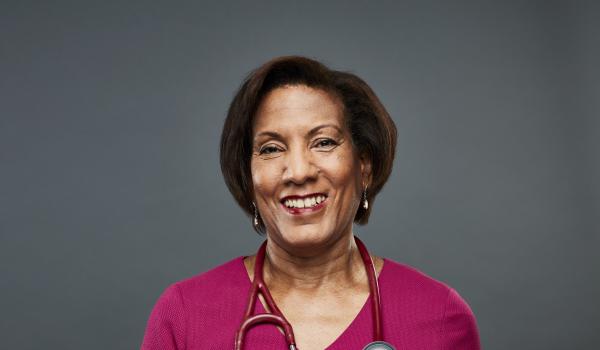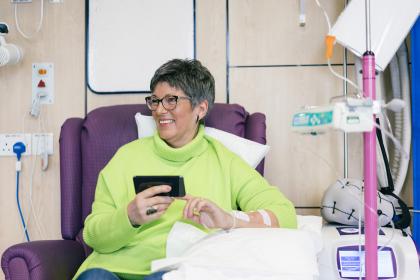Dr Alison Wint, a GP in South Gloucestershire and clinical lead for cancer in her local area, believes that awareness of symptoms and early diagnosis of all cancers is crucial. Dr Wint discusses her work on earlier diagnosis of ovarian cancer and why awareness is so important…
A choice I don't regret
When I first qualified as a doctor I had ambitions to become a gynaecologist, but my experience as a junior doctor made me realise that it wasn't for me. Instead I became a GP and I have no regrets about my choice. I've now been a GP for over 30 years!
One in two people alive today will be diagnosed with cancer, and like most others I have personal experience of cancer through friends and family members. My experience with cancer personally and professionally helps to drive my work.
My entry into this field started when I became a Macmillan GP. These are practising GPs who are supported by Macmillan to improve cancer care across the UK. This work involved me in developing cancer pathways towards improving cancer services for patients. I even changed the practice I work in so I could devote more of my time to help develop cancer services.
Awareness is key
By 2008 it was recognised nationally that one of the best ways to improve cancer outcomes for patients was to diagnose it earlier, allowing treatment to be more effective. Following this, the national agenda changed, to focus more on raising the awareness of cancer symptoms not only to the public but also to medical professionals.
A public awareness raising campaign called 'Be Clear on Cancer' was set up to explain the importance of visiting your GP with symptoms that could be cancer-related. This campaign was incredibly powerful and reached thousands of people. I was honoured to be part of the campaign, as the GP highlighting the importance of bloating and how it could be a symptom of ovarian cancer. It's essential that women know the symptoms of ovarian cancer.
No GP wants to miss a cancer diagnosis…
Statistics show that on average a GP will diagnose between eight or nine cancers a year, and most of those will probably be more common cancers such as breast cancer or bowel cancer. Ovarian cancer is much less common and the symptoms are less widely known. This is something we need to keep in mind as medical practitioners.
The symptoms of ovarian cancer are persistent bloating, feeling full or a loss of appetite, pelvic or abdominal pain and urinary symptoms (needing to wee more urgently or more often). I suggest that if you feel something new in your body that is frequent and persistent, it deserves a trip to your GP.
For us as GPs it's about providing a safety net, as in some cases the CA125 blood test and ultrasound results may come back as negative. If the symptoms persist it's time to reinvestigate.
We have a golden rule in our practice – if someone comes back a third time with the same problem, you do something.
A positive change
As awareness grows, I think it's worthwhile highlighting how things have changed. When I first started, my work involved sharing information about symptoms locally and to enable direct access by GPs to key diagnostic tests. Things are now looking positive – some GPs in the UK didn't have access to the CA125 blood test or non-obstetric ultrasound scans five years ago, but now they do and things are moving forward.
Along with this, NICE has published a set of GP referral guidelines, which summarise the symptoms and advice following a raised CA125 test. Target Ovarian Cancer offers GP training, which takes GPs through the symptoms and the guidelines for referring women for further tests. This is important as not everyone will know how to describe their symptoms, or even what things in their body are important to tell a GP about. Target Ovarian Cancer's training helps translate guidance into practice, helping clinicians become more aware of the symptoms and the existing diagnostic tests.
It's hugely positive that so many people are hard at work on earlier diagnosis of ovarian cancer. We need to work together to raise awareness of the symptoms of ovarian cancer across the UK. The earlier ovarian cancer is picked up, the more effective the treatment is. It's that simple.
If you’ve been affected by this story and would like to speak to a specialist nurse, you can call our dedicated support line on 020 7923 5475 or contact us: [email protected]. We're open from 9am until 5.30pm, Monday to Friday.





